第53章 LETTER X(3)
Just as this brilliant display left the room, a figure in richer coloring of skin appeared--Babu, the head servant, in his beautiful Hadji dress. He wore white full trousers, drawn in tightly at the ankles over black shoes, but very little of these trousers showed below a long, fine, linen tunic of spotless white, with a girdle of orange silk. Over this was a short jacket of rich green silk, embroidered in front with green of the same color, and over all a pure white robe falling from the shoulders. The turban was a Mecca turban made of many yards of soft white silk, embroidered in white silk. It was difficult to believe that this gorgeous Mussulman, in the odor of double sanctity, with his scornful face and superb air, could so far demean himself as to wait on "dogs of infidels" at dinner, or appear in my room at the Stadthaus, with matutinal tea and bananas!
This magnificence heralded the Datu Klana, Syed Abdulrahman, the reigning prince of the native State of Sungei Ujong, his principal wife, and his favorite daughter, a girl of twelve. It has been decided that I am to go to Sungei Ujong, and that I am to be escorted by Mr.
Hayward, the superintendent of police, but, unfortunately, I am to go up in the Datu Klana's absence, and one object of his visit was to express his regret. This prince has been faithful to British interests, and is on most friendly terms with the resident, Captain Murray, and the Governor of Malacca. During his visit Babu interpreted, but Miss Shaw, who understands Malay, said that, instead of interpreting faithfully, he was making enormous demands on my behalf! At all events, Syed Abdulrahman, with truly exaggerated Oriental politeness, presented me with the key of his house in the interior.
This prince is regarded by British officials as an enlightened ruler, though he is a rigid Mussulman. His dress looked remarkably plain beside that of the splendid Babu. He wore a Malay bandana handkerchief round his head, knotted into a peak, a rich brocade baju or short jacket, a dark Manilla sarong, trousers of Mandarin satin striped with red, a girdle clasp set with large diamonds, and sandals with jeweled cloth-of-gold straps. His wife, though elderly and decidedly plain looking, has a very pleasing expression. She wore a black veil over her head, and her kabaya, or upper garment, was fastened with three diamond clasps. The bright little daughter wore a green veil with gold stars upon it over her head, and ornaments of rich, red gold elaborately worked. The Datu Klana apologized for the extreme plainness of their dress by saying that they had only just arrived, and that they had called before changing their traveling clothes. When they departed the two ladies threw soft silk shawls over their heads, and held them so as to cover their faces except their eyes.
There are now sixty-seven thousand Malays in the British territory of Malacca, and the number is continually increased by fugitives from the system of debt-slavery which prevails in some of the adjacent States, and by immigration from the same States of Malays who prefer the security which British rule affords.
[The police force is Malay, and it seems as if the Malays had a special aptitude for this semi-military service, for they not only form the well-drilled protective forces of Malacca, Sungei Ujong, and Selangor, but that fine body of police in Ceylon of which Mr. George Campbell has so much reason to be proud. Otherwise very few of them enter British employment, greatly preferring the easy, independent life of their forest kampongs.]
The commercial decay of Malacca is a very interesting fact.* Formerly fifty merchantmen were frequently lying in its roads at one time. Here the Portuguese fleet lay which escorted Xavier from Goa, and who can say how many galleons freighted with the red gold of Ophir floated on these quiet waters! Now, Chinese junks, Malay prahus, a few Chinese steamers, steam-launches from the native States, and two steamers which call in passing, make up its trade. There is neither newspaper, banker, hotel, nor resident English merchant, The half-caste descendants of the Portuguese are, generally speaking, indolent, degraded with the degradation that is born of indolence, and proud. The Malays dream away their lives in the jungle, and the Chinese, who number twenty thousand, are really the ruling population.
[*Linscholt, two hundred and seventy years ago, writes:--"This place is the market of all India, of China, and the Moluccas, and of other islands round about, from all which places, as well as from Banda, Java, Sumatra, Siam, Pegu, Bengal, Coromandil, and India, arrive ships which come and go incessantly charged with an infinity of merchandises."]
The former greatness of Malacca haunts one at all times. The romantic exploits of Albuquerque, who conquered it in 1511, apostrophized in the Lusiad--"Not eastward far though fair Malacca lie, Her groves embosomed in the morning sky, Though with her amorous sons the valiant line Of Java's isle in battle rank combine, Though poisoned shafts their ponderous quivers store, Malacca's spicy groves and golden ore, Great Albuquerque, thy dauntless toils shall crown," live again, though my sober judgment is that Albuquerque and most of his Portuguese successors were little better than buccaneers.
I like better to think of Francis Xavier passing through the thoroughfares of what was then the greatest commercial city of the East, ringing his bell, with the solemn cry, "Pray for those who are in a state of mortal sin." For among the "Jews, Turks, infidels, and heretics" who then thronged its busy streets, there were no worse livers than the roistering soldiers who had followed Albuquerque.